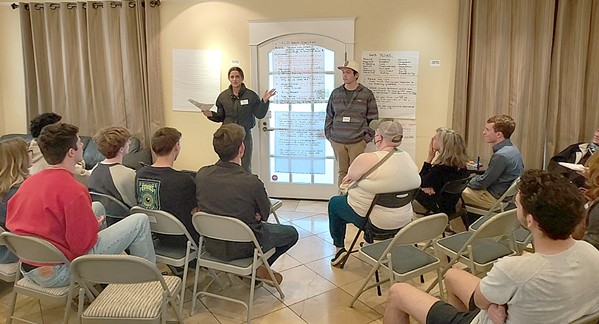The SLO Rent Coalition and 5th District Supervisor candidate Susan Funk shed light on renter woes and potential solutions
By Bulbul Rajagopal[{
"name": "Newsletter Promo",
"id": "NewsletterPromo",
"class": "inlineCenter",
"insertPoint": "4",
"component": "15264767",
"requiredCountToDisplay": "0"
},{
"name": "Ad - Medium Rectangle CC01 - 300x250",
"id": "AdMediumRectangleCC01300x250",
"class": "inlineCenter",
"insertPoint": "8",
"component": "2963441",
"requiredCountToDisplay": "12"
},{
"name": "Ad - Medium Rectangle LC01 - 300x250",
"id": "AdMediumRectangleCC01300x250",
"class": "inlineCenter",
"insertPoint": "18",
"component": "2963441",
"requiredCountToDisplay": "22"
},{
"name": "Ad - Medium Rectangle LC09 - 300x250",
"id": "AdMediumRectangleLC09300x250",
"class": "inlineCenter",
"insertPoint": "28",
"component": "3252660",
"requiredCountToDisplay": "32"
}]
San Luis Obispo resident Diego Cervantez pays $1,000 per month to share a room with another tenant in a house with six people—and that doesn't include utilities.
"We're paying upwards of $5,000 to $6,000 for my rental, and a lot of that issue of pricing is exacerbated by the fact that there is quite low rental availability in the city," he told New Times. "When there is a much higher demand for rentals in the city, it contributes to driving up the prices."
Cervantez's living situation, a common one for many SLO County renters, propelled him to join a tenant-led advocacy group called SLO Rent Coalition. It's gaining steam through its community meetings and shoe-leather campaigns speaking up against rising rent, unsafe living conditions, and a lack of enforcement.
"We want to make sure that houses are secure, they have good deadbolts, we don't want situations where tenants are faced with black mold and toxic indoor air quality," Cervantez said. "We also want to make sure that housing in San Luis Obispo County is economically viable and rental prices are not to a point where it's out of reach for working-class people."
Cervantez and his fellow coalition member Tyler Coari demanded more accountability from the SLO City Council last summer regarding the community's issues of substandard housing. At the time, the two spoke as Cal Poly students.
Coari also approached the City Council last October as a member of Cal Poly's Associated Students Incorporated to suggest better awareness programs that could help define what constitutes a code violation. As SLO Rent Coalition members, he and Cervantez canvass communities without an affiliation to Cal Poly.
"Lack of enforcement is one of the very common issues renters faces that has been brought up consistently by our members," Cervantez said. "In meetings, there's been quite extensive talk where ... when they go to their landlords, a lot of them have had experience that landlords tend to push off the issue or try to deflect blame on to the tenants, which is a lot of the time a breach of the lease."
He added that the city's process of filing a complaint isn't streamlined, and it's especially hard when the tenant is vulnerable and fears retaliation from the landlord. Prior New Times reporting found SLO's code enforcement hotline at (805) 594-8188 to be the city's only mechanism for rental housing enforcement, with Community Development Director Michael Codron saying it doesn't have a high call volume.
Election campaign season is converging with the SLO Rent Coalition's door-to-door canvassing, and Cervantez and Coari confirmed to New Times that several coalition members have been independently advocating that residents vote for local candidates who support robust housing rights.
One of them is Atascadero City Councilmember Susan Funk, who is vying for the 5th District seat on the SLO County Board of Supervisors. On March 5, district constituents—who live in an area that now includes part of Cal Poly and its surrounding neighborhoods—will vote for either Funk or her opponent, Atascadero Mayor Heather Moreno, during the primary. Incumbent 5th District Supervisor Debbie Arnold isn't running for reelection.
Funk is familiar with the county's ballooning housing crisis. For the past three years and counting, she's chaired the Homeless Services Oversight Council through which she led the development of the countywide plan to cut homelessness in half in five years.
"The key issue for us is ultimately expanding supply of smaller places that can be more affordably rented. We're in a context where the average house size has been increasing significantly but the average household size has been declining," the Democrat said. "There is a lot of pressure on the market where households want their own place that maybe aren't that big. There's of course a lot of sharing to make that work. It's why we have such a tight market now."
Funk added that even the term "affordable" must be approached in a relative sense. A balanced solution includes a range of units of differing sizes, with some bigger houses also included to be profitable to developers.
The housing crisis developed over a long period of time, she said, adding that supervisors weren't proactive about addressing the issue. Funk underscored the need for subsidized housing where projects financed through federal tax credits require local contributions to make them work.
She criticized supervisors for dropping the ax on the inclusionary housing program without replacing it with another contribution plan. The inclusionary housing fund required developers to either add more affordable units to their projects or pay in-lieu fees starting at $8 per square foot to bolster future economical housing.
"The county did something that was late to the game, it was underpowered and not particularly well-organized, and not broad enough," Funk said. "It didn't generate that much money and these projects don't happen that very quickly, so it was then rejected as, 'Well, it didn't build us any housing.' These are units that take five to seven years and typically require six to eight different sources of funding with a local match contribution for every unit."
Funk has some ideas to help "pony up" about $40,000 a unit for a local contribution fund of some kind. That includes fee waivers or long-term deferrals of impact fees, as well as direct contributions from something that's similar to inclusionary housing fees. She also recommended that supervisors tap into nontraditional but innovative groups like homeless service providers, school districts, and community colleges to prepare them to be housing developers.
Another step forward in the direction of affordable housing can happen right in one's backyard, according to Funk.
"We need to make it easier for people to finance and construct accessory dwelling units on their properties because that's a form of housing that's a win-win," she said. "The homeowner gets income generation on their property, it adds value to the property. It adds to the housing stock, and it's stock that's not enormous. So, it has the potential of being rented more affordably. It doesn't take five to seven years in permission from God and everybody to make it happen!"
Funk hasn't met members of SLO Rent Coalition yet but the group and its mission for better living conditions for renters are on her radar through its social media postings. She stressed the need to encourage and support landlords to be good ones.
"Housing quality is a serious issue for a lot of students and people with modest incomes who feel disempowered because they don't know their rights and aren't confident with enforcement because they don't have an alternative," she said. "I've had people sobbing in my arms because they were about to lose housing and they had tried everything on the list."
Funk's opponent and Atascadero Mayor Moreno said she didn't have availability to talk to New Times before press time.
For SLO Rent Coalition members Cervantez and Coari, their primary mission is to recruit more people around the county rather than immediately tackling policy change. More members means it'll be easier to sustain their driving force, Coari said.
"Our goal currently is to modernize local tenant protection, prevent 'renoviction,' and ensure working people have access to safe, secure, and affordable housing they need in our city to thrive," he said. "That's our North Star." Δ
Reach Staff Writer Bulbul Rajagopal at [email protected].
Latest in News
Readers also liked…
-

Coast Unified teachers upset over new position's salary and qualifications
Oct 20, 2022 -

SLO police identify alleged driver who hit and killed couple
Dec 22, 2022 -

When the levee breaks: Oceano residents, county officials walk a tightrope of regulations to manage Arroyo Grande Creek, which some say led to the levee's failure in January
May 18, 2023










